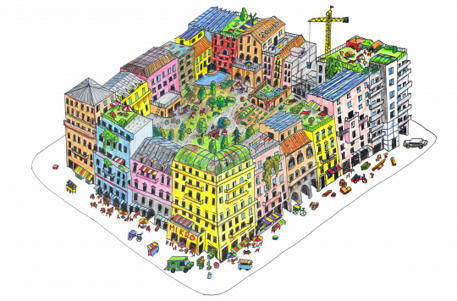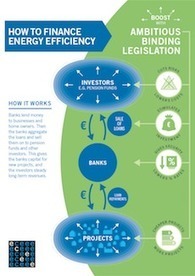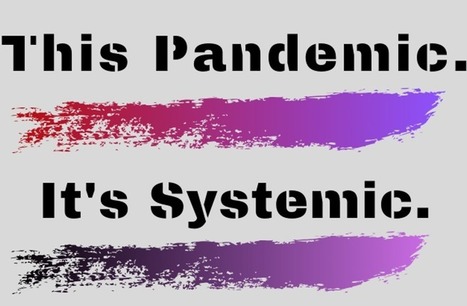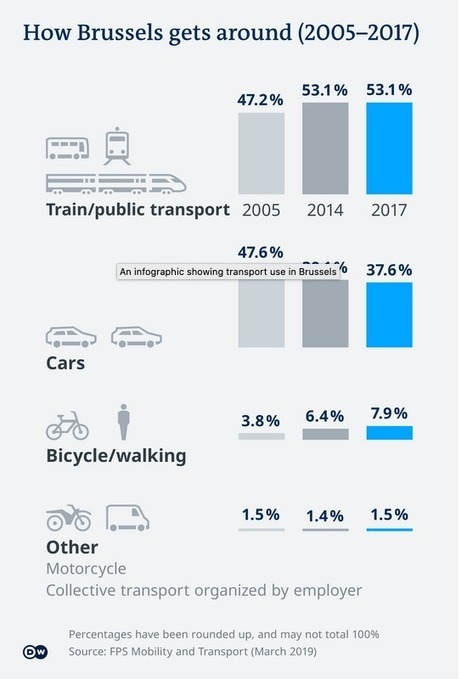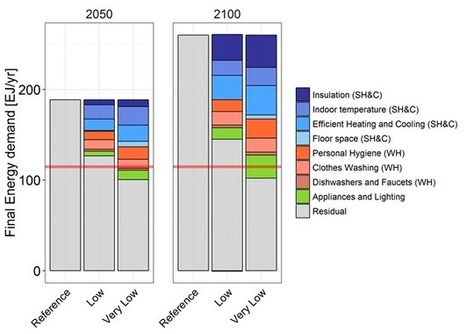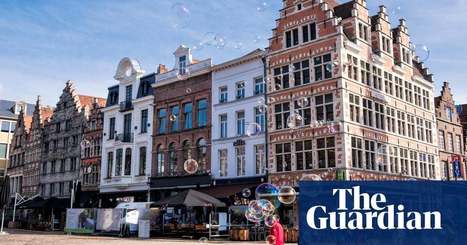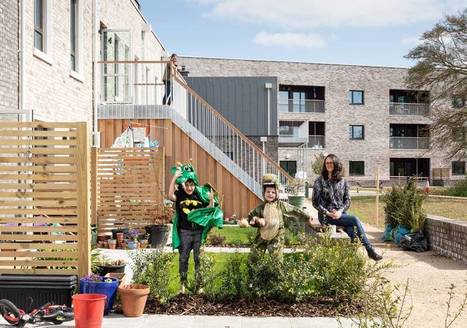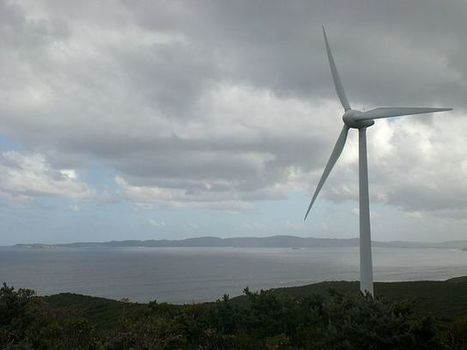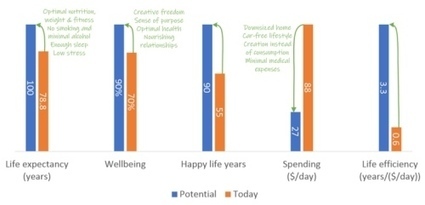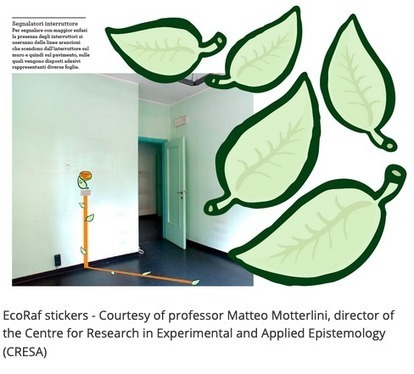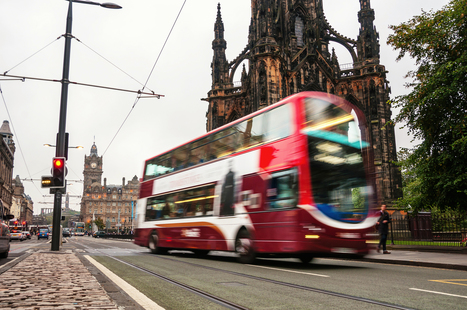 Your new post is loading...

|
Scooped by
Energy Cities
January 26, 2021 1:45 AM
|
La sobriété énergétique, energy sufficiency en anglais, est l’objet de recherches de plus en plus nombreuses tout en étant également mise en application dans différents projets, différents pays. Elle est malgré tout souvent le parent pauvre des politiques publiques qui développent des stratégies d’efficacité énergétique et de développement des énergies renouvelables en ratant cette première marche de la transition énergétique.
La sobriété énergétique est une approche qui vise à réduire les consommations d’énergie à travers des changements de comportements, de styles de vie et d’organisation collective.

|
Scooped by
Energy Cities
January 8, 2021 1:35 AM
|
Les Suisses vivant dans des coopératives d’habitation expérimentent d’autres manières de vivre ensemble. Pour l’un de leurs précurseurs, il ne s’agi

|
Scooped by
Energy Cities
December 3, 2020 3:21 AM
|
An environmental neuroscientist explores the disparities that exist in public space in order to create more equitable urban environments.

|
Scooped by
Energy Cities
October 6, 2020 4:09 AM
|
A new project called NUDGE, funded by the European Horizon 2020 programme, aims to study, test and evaluate different behavioural interventions for energy efficiency in Greece, Belgium, Germany, Portugal and Croatia. Reducing energy consumption demands behavioural changes – from the way we use our heating and electric appliances to the way we cater. Recent studies and social engagement practices have identified ways to influence behaviour through nudging interventions to support people’s behavioural choices in a predictable manner.

|
Scooped by
Energy Cities
July 27, 2020 3:03 AM
|
Rob Hopkins is an author and a Co-Founder of Transition Town Totnes and Transition Network. He approaches the question of “What could possibly go right?” with a fascination in the power of imagination for our future.

|
Scooped by
Energy Cities
June 29, 2020 2:14 AM
|
As we navigate this connected set of crises it’s clear that we’re at an unprecedented moment of reckoning in the history of our civilizations.

|
Scooped by
Energy Cities
May 18, 2020 2:38 AM
|
There has been an on-going shift in mobility in cities but that has accelerated as cities cope with the coronavirus crisis. Martin Kuebler discusses latest developments in an article on the Deutsche Welle website. Coronavirus inspires cities to push climate-friendly mobility Cities around the world have been at a standstill, trying to stop the…

|
Scooped by
Energy Cities
May 14, 2020 3:26 AM
|
En tant qu’expert·e·s en psychologie sociale, les parallèles et divergences entre la crise du covid-19 et l’urgence climatique, et plus particulièrement sur la manière dont la population y réagit, nous interpellent profondément. Face à une pandémie, la très grande majorité des individus a accepté des mesures restreignant strictement son quotidien et ses libertés individuelles. Il en est tout autre quand il s’agit de lutter contre le profond dérèglement climatique que l’humain a provoqué.

|
Scooped by
Energy Cities
April 14, 2020 8:23 AM
|
A forthcoming series of webinars from CIVITAS PORTIS will look at how to achieve mobility behaviour change. The first of these will take place on 30 April.

|
Scooped by
Energy Cities
March 26, 2020 3:18 AM
|
The energy-consuming activities carried out in buildings are extremely diverse. Examples spread from boiling water for a cup of tea in the UK and working on a computer in an American bank to using an air conditioner in India or cooking with traditional biomass in Africa. Due to this diversity, there will be no one-size-fits-all solution to decrease energy demand in buildings. Instead, reducing energy demand requires a flurry of solutions to be explored, mixing both technological and behavioural approaches. In a recent study, we analyse the manifold opportunities that buildings offer to reduce energy demand, and compute their potential at the global level.

|
Scooped by
Energy Cities
January 22, 2020 1:47 AM
|
We asked locals in the Belgian city to tell us how things have changed since the introduction of its circulatieplan in 2017

|
Scooped by
Energy Cities
November 27, 2019 2:54 AM
|
Marmalade Lane, a co-housing development in Cambridge, UK, is the first community of its type in the city. The new-build house model brings both the commune and urban family living into the 21st century.

|
Scooped by
Energy Cities
September 24, 2019 7:46 AM
|
Commitment to UN SDG seven “to ensure access to affordable, reliable, sustainable and modern energy for all” is essential for global peace and prosperity
|

|
Scooped by
Energy Cities
January 13, 2021 4:30 AM
|
An unexpected positive effect of the lockdown measures put in place in March this year was the sudden increase in the use of bicycles.Europeans, encouraged by authorities to reduce the strain on public transport, took to two wheels. Cycling helps improve air quality and keep down congestion on the roads. Major cities saw air pollution sink to record lows during lockdown, but bicycles also gave people a way to exercise. In May, the EU announced that funding for sustainable infrastructure, including for new or better bike lanes, will be doubled to €20 billion.

|
Scooped by
Energy Cities
January 4, 2021 2:32 AM
|
As cities emerge from coronavirus lockdowns, the way people use parks, stores, restaurants, transit, streets and homes is changing in ways both subtle and significant.

|
Scooped by
Energy Cities
November 26, 2020 4:03 PM
|
By repairing their items instead of throwing them away, citizens of Vienna are actively contributing to the fight against climate change
Repairing and reusing one’s items is crucial in the fight against climate change. Instead of throwing stuff away and generating more and more waste, citizens of Vienna have had an opportunity to have them once again made usable thanks to the city’s repair vouchers and receipts.
A massive success, both saving money and protecting the environment
The Vienna repair voucher is a one-of-a-kind platform that brings together consumers, vendors and repair shops. The network created by the city allows for citizens who purchase from specific venues to have their items repaired at one of the Austrian capital’s many repair shops at a significantly reduced price by simply downloading the repair voucher on their phones.
"Repairing instead of throwing it away, that is an active contribution to climate protection and I am pleased that the Viennese are taking our offer so well," said Environment City Councilor Ulli Sima

|
Scooped by
Energy Cities
September 16, 2020 4:46 AM
|
Retrosuburbia provides the patterns and models that need to be replicated across our residential heartlands to achieve a scale of impact. By replacing a fair slab of the current household consumption activity (currently about 55% of GDP in Australia) with downsized and much more efficient ways to provide basic needs in the household and community non-monetary economies, society could radically reduce greenhouse gas emissions beyond the 8% reductions resulting from the pandemic.

|
Scooped by
Energy Cities
July 27, 2020 2:59 AM
|
Behaviour change – reducing emissions by changing how we live our lives – should be part of every government and think tank’s sustainable scenario, explains Schalk Cloete. That’s because impressive advances in energy efficiency and clean energy won’t be enough to contain the emissions of a world continuing with the essential task of lifting billions …

|
Scooped by
Energy Cities
June 10, 2020 4:49 AM
|
While the question of lifestyles and their sobriety has long been at the heart of ecological thinking, its explicit integration into national and international decarbonation pathways is relatively new. What methodological and substantive challenges does this development pose in terms of understanding, representing and projecting the ecological transition? Key Messages
- An evolution in low-carbon foresight exercises can be observed: it opens up a new field of possibilities and space for exploration by explicitly considering changes in lifestyle and behaviour.
- Better integrating these dimensions into foresight research can make four main contributions to the policy discussion: 1) showing the limits of current strategies and reaffirming the technical and social character of the transition; 2) shifting the focus to technical solutions and testing the feasibility and role of other transformations; 3) building a common language and making the transition more concrete; and 4) encouraging to increase our knowledge of social transformations and break out of disciplinary silos.
- These benefits can be realised provided that the political dimension of exploring lifestyles is recognised, that the challenges inherent in multidisciplinary approaches are overcome, and that specific methodologies are developed.

|
Scooped by
Energy Cities
May 18, 2020 2:36 AM
|
Understanding how people decide to use less energy at home or at work is crucial to boost virtuous behaviours. Our reaction to any novelty is so complex that a lot of socio-psychological research has been done to try to make it more predictable. Gianluca Dotti discusses much of this research in an article on the…

|
Scooped by
Energy Cities
April 23, 2020 3:40 PM
|
The measures taken to fight the Covid-19 pandemic are changing our daily lives. Many see this as an opportunity to initiate more sustainable behaviours, and even hope that this experience of imposed sobriety will be transformed into a real awareness in favour of more virtuous lifestyles for the environment. However, this hope must be put into perspective: our lifestyles are determined by a set of factors, many of which have not been erased by health measures, which explains why certain aspects of these measures are experienced as a constraint. The long-term impact of the current health and socio-economic crisis thus depends on how the framework that structures our lifestyles will evolve. Public action has a key role to play in this process, which needs to be re-examined.

|
Scooped by
Energy Cities
April 6, 2020 5:01 AM
|
Amidst increasing awareness and growing media attention on individual action and lifestyle changes, it is crucial to understand how these societal aspects can be integrated structurally in the analysis of long-term decarbonisation pathways and included as a core component of debates on policies and actions. This Issue Brief clarifies the challenges and, based on the analysis of foresight exercises, provides conceptual frameworks that can help navigate the issues and structure political discussions.

|
Scooped by
Energy Cities
January 22, 2020 3:54 AM
|
On 10 January 2020, the City Council of the Scottish city of Edinburgh presented its draft plans for the coming 10 years that aim to take the city towards the goal of being a carbon neutral city by 2030.
To do this, Edinburgh proposes to follow a 'push and pull' strategy to make car use less attractive and to motivate people to use sustainable modes of transport.

|
Scooped by
Energy Cities
January 20, 2020 9:49 AM
|
L'installation du mouvement social dans la durée pourrait faire progresser durablement la pratique du vélo à Paris, puis sur l'ensemble du territoire français.

|
Scooped by
Energy Cities
November 27, 2019 2:03 AM
|
How do you factor future behaviour change into transport, housing, workplace and energy infrastructure planning? Clearly, future plans based on past behaviour will end up being wrong. And metrics that tell us which behaviour is most efficient can point us in better directions. We won’t find the answer until we start measuring it. That’s why …
|
 Your new post is loading...
Your new post is loading...






